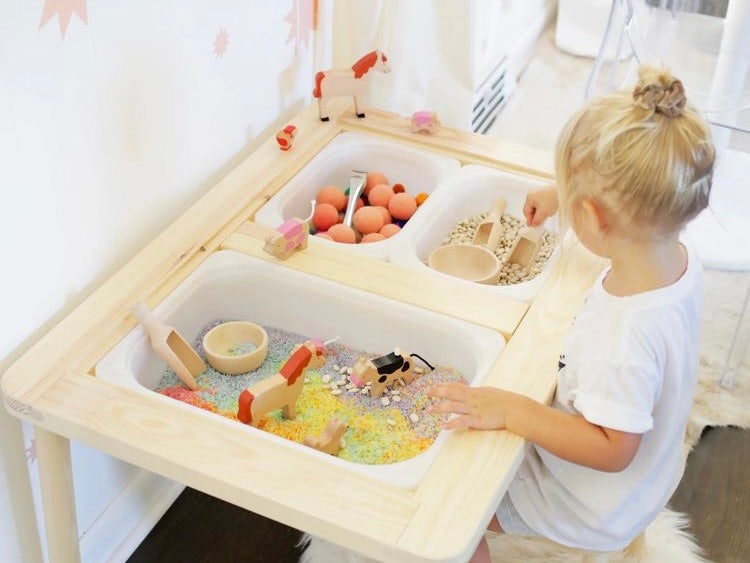
As parents, we're constantly seeking ways to support our kid’s growth and development… and keep them busy while we try to make dinner. One thing that ticks both boxes? Sensory play. The term might sound fancy, but it simply refers to any activity that engages the senses—touch, sight, smell, sound, and taste– in a way that’s fun for your child. From squishy textures to vibrant colors, sensory play offers a myriad of benefits that go far beyond just keeping your little ones entertained – although it does that too! Here’s how the many benefits of sensory play can help your tot learn, grow, and thrive.
Enhancing Cognitive Growth through Sensory Play
So how does sensory play help cognitive development? When kids manipulate materials with new textures, colors, smells, and sensations, they're not just having fun, they're also building new neural connections that prime their brains for future learning. Sensory play also comes with plenty of opportunities to practice problem-solving skills. It often presents fine motor challenges that require concentration and perseverance. Tasks like scooping, pouring, and manipulating small objects often require kids to go through a few phases of trial and error. All the while, they’re gathering information, trying new things, and performing their own experiments with the materials.
The Therapeutic Power of Sensory Play
Have you ever noticed how soothing it can be to sink your hands into a bowl of sand or run your fingers through water? Sensory play has therapeutic benefits for kids and adults alike. It can help children regulate their emotions, reduce stress, and improve focus. This type of play is especially beneficial when they're feeling overwhelmed or anxious. Creating a sensory corner at home with various tactile materials can serve as a safe space for your child to unwind and find comfort.
Sensory Play for Special Needs Children
The benefits of sensory play for special needs kids can be profound. For kids with sensory processing disorders or other special needs, sensory play can provide a structured and enjoyable way to explore different sensations. Activities that feature sensations your child already loves can become go-to tools for calming and self-regulating when other sensory inputs are overwhelming. On the other hand, sensory activities that stretch them out of their comfort zone just a bit can gradually help them to tolerate new sensory inputs. By tailoring sensory activities to their preference and tolerance level, you can introduce them to new sensations at their own pace.
The Science Behind Sensory Play
While it might seem like pure fun, sensory play is backed by science. Research shows that sensory play can help increase kids’ focus and capacity for learning, establish new neural connections, and support overall cognitive development. In short, sensory play experiences help wire the brain's pathways for learning. As children manipulate different materials and engage their senses, their brains are building connections that help them develop language, problem-solving skills, and creativity. So, the next time your child is elbow-deep in finger paints, know that they're not just making a mess—they're making important brain connections too!
Family Bonding through Sensory Play
Sensory play isn't just an activity for your child; it's an opportunity for quality family time! Joining in on sensory play can help you and your child laugh, explore, and bond. Pulse, we think you’ll be surprised at how fun it actually is to play with kinetic sand or squish homemade chickpea play foam!
In conclusion, sensory play is more than just a way to keep your child occupied—it's a powerhouse of developmental benefits. From enhancing cognitive growth to calming the “I-didn’t-nap-today” tantrums to fostering sweet family bonding moments, the possibilities are endless. So bust out the playdough, the slime, the homemade sound shakers, and let your littles squish, sniff, and explore, and create.
Need some sensory play ideas to get started? Our favorite Sensory Play Activities for Toddlers are fun and easy to set up!

